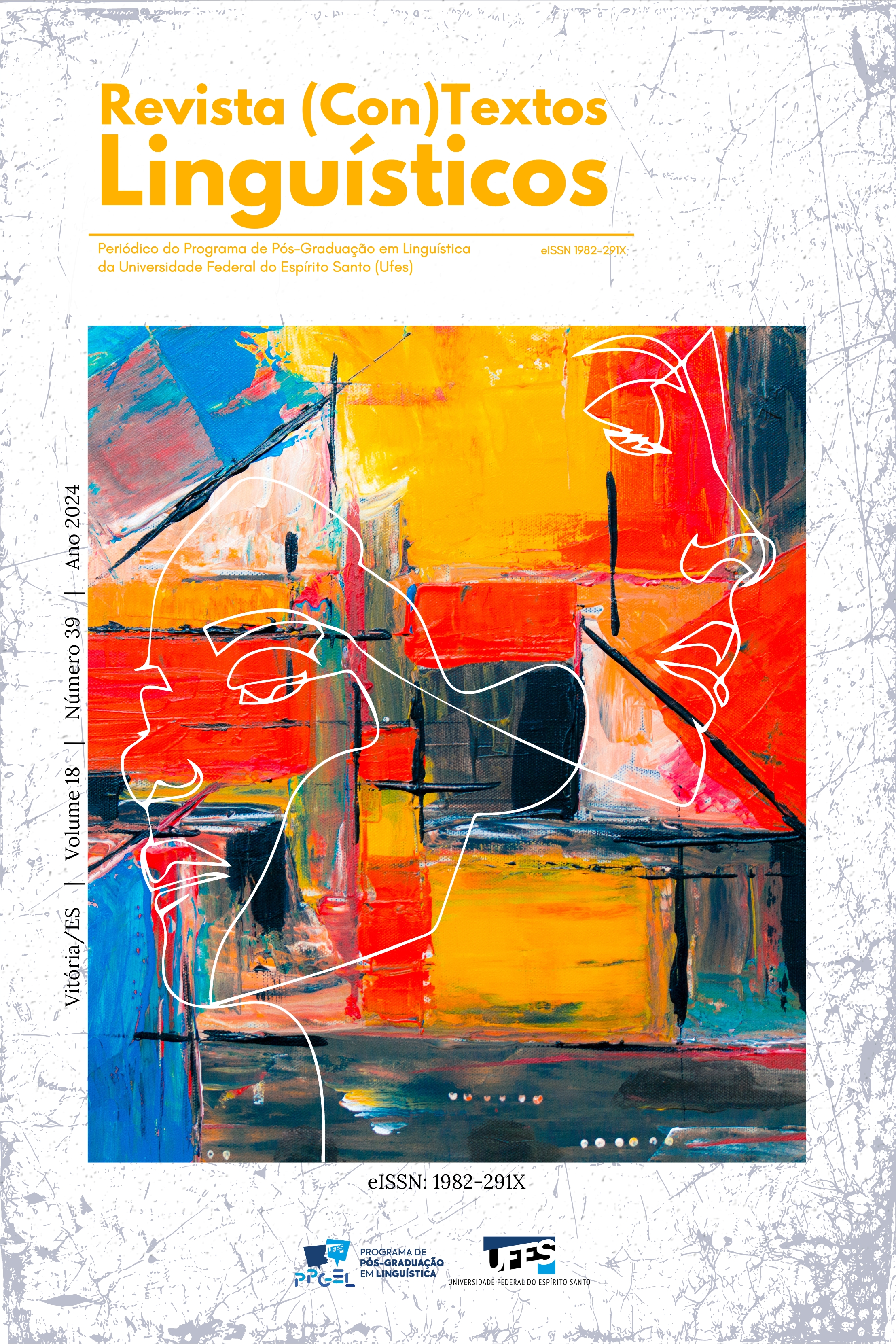Modal periphrases in lectures and oral interviews
DOI:
https://doi.org/10.47456/rctl.v18i39.43518Keywords:
Mood, Modality, Modal periphrasesAbstract
In the grammatical tradition of Brazilian Portuguese, the term mood labels the category responsible for expressing the indicative, subjunctive and imperative. For linguists, the expression of mood does not only occur morphologically through mood-temporal suffixes, but also through other resources. Considering that mood can also be expressed by auxiliary verbs, the objective of this paper is to describe the modal periphrases and their uses in a corpus of spoken language formed by eight higher education and pre-university classes and ten oral interviews with researchers. From the data tabulation, it was verified that the most frequent modal periphrases are those of deontic modality, both in classes and in interviews in the corpus investigated in this work. The most frequent uses of deontic modal periphrases in classes are related to mentioning obligations of academic life, such as submitting papers, teaching, correcting tests, solving exercises, dedicating time to studying. Epistemic modality periphrases are those with the second highest frequency of occurrence both in classes and interviews. Some of the uses of epistemic modal periphrases are the expression of potential events, the expression of irrealis modality, the expression of assumptions and conjectures, the expression of suggestions for improvements that could be implemented in different sectors of society based on the results they found in their research. In classes, dynamic modality periphrases were used by teachers to check the conditions of the class, to express the capacity of the subject participant of the sentence, generally a third-person or generic participant. In interviews, the most frequent use of the dynamic modality is related to the use of verbs that express conclusions that researchers reached based on detection, perception or observation.
Downloads
References
AUSTIN, J. L. How to do Things with words. New York: Oxford University Press, 1965.
BECHARA, E. Moderna gramática portuguesa. 37. ed. R. de Janeiro: Lucerna, 2002.
CASTILHO, A. T. Nova Gramática do Português Brasileiro. S. Paulo: Contexto, 2010.
CHAFE, W. Linguistic differences produced by differences between speaking and writing. In: OLSON, D. R.; TORRANCE, N.; HILDYARD, A. (Eds). Literacy, Language and Learning: the nature and consequences of reading and writing. Cambridge: Cambridge University Press, 1985. p. 105-123.
CUNHA, C.; CINTRA, L. Nova Gramática do Português Contemporâneo. 7. ed. Rio de Janeiro: Lexikon, 2017.
DALL’AGLIO-HATTNHER, M. M. A manifestação da modalidade epistêmica: um exercício de análise dos discursos do ex-presidente Collor. Araraquara, 1995. 111 f. Tese (Doutorado em Linguística e Língua Portuguesa) – Faculdade de Ciências e Letras, Universidade Estadual Paulista, São Paulo, 1995.
DALL’AGLIO-HATTNHER, M. M. Campos semânticos modais: a modalidade dinâmica. In: ANTONIO, J. D. (Org.). Estudos Descritivos do Português. História, uso, variação. São Carlos: Claraluz, 2008. p. 133-148.
DALL'AGLIO-HATTNHER, M. M. Entre o poder e o dever: fatores intervenientes na expressão da modalidade nos discursos de posse presidencial. Gragoatá, v. 14, n. 27. p. 155-168, 2009.
HENGEVELD, K. Mood and Modality. In: BOOIJ, G.; LEHMANN, C.; MUGDAN, J. (Eds). Morphology: A handbook on inflection and word formation. Berlin: Mouton de Gruyter, 2004. p. 1190-1202.
ILARI, R.; BASSO, R. M. O verbo. In: ILARI, R.; NEVES, M. H. M. (Orgs.) Gramática do português culto falado no Brasil - volume 2. Campinas: Ed. da Unicamp, 2008, p. 163-365.
KURY, A. G. Novas lições de análise sintática. 7. ed. São Paulo: Ática, 1997.
NARROG, K. On defining modality again. Language Sciences, v. 27, p. 165-192, 2005.
NEVES, M. H. M. Texto e gramática. São Paulo: Contexto, 2006.
NEVES, M. H. M. Gramática de usos do português. São Paulo: Editora Unesp, 2000.
NEVES, M. H. M. A gramática do português revelada em textos. São Paulo: Editora Unesp, 2018.
NUYTS, J. Modality: overview and linguistic issues. In: FRAWLEY, W. (Ed). The Expression of Modality. New York: Mouton de Gruyter, 2006, p. 1-25.
PALMER, F. R. Mood and modality. 2. ed. Cambridge: Cambridge University Press, 2001.
PRETI, D. Análise de Textos Orais. São Paulo: FFLCH/USP, 1993.
SEARLE, J. R. Expression and meaning. Cambridge: Cambridge University Press, 1979.
TERRA, E. Curso prático de gramática. 7. ed. São Paulo: Scipione, 2017.
Downloads
Published
Issue
Section
License
Copyright (c) 2024 Revista (Con)Textos Linguísticos

This work is licensed under a Creative Commons Attribution-NonCommercial 4.0 International License.
Authors assign the copyright of the article to the publisher of Revista (Con)Textos Linguísticos (Graduate Program in Linguistics, Ufes), if the submission is accepted for publication. Responsibility for the content of articles rests exclusively with their authors. The full or partial submission of the text already published in this periodical to any other periodical is prohibited.
This work is licensed under a Creative Commons Attribution-NonCommercial 4.0 International License.



